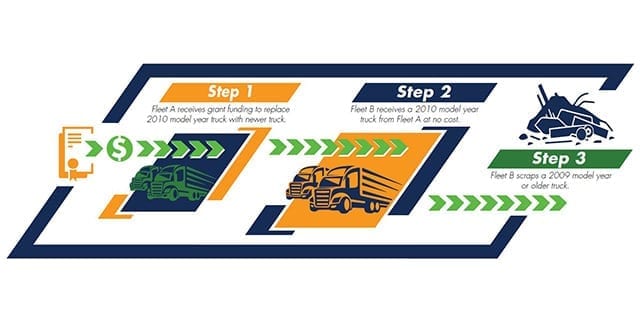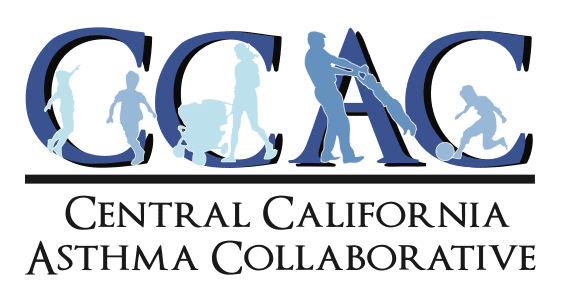California’s San Joaquin Valley struggles with some of the nation’s worst air quality, due to the surrounding mountain range trapping pollution, and heavy traffic on Interstate 5 and Highway 99 that runs through the region. Much of the traffic comes from long-haul medium- and heavy-duty trucks, which are a significant contributor to air pollution in the central valley.
The San Joaquin Valley Air Pollution Control District (APCD) is currently accepting applications for the Truck Replacement Program (TRP). The TRP gives grants to fleets to replace on-road diesel trucks with cleaner technology units and to expand fleets with the cleanest technology available, both of which help reduce harmful emissions from trucking.
The Truck Replacement Program gives grants to fleets operating in the San Joaquin Valley to replace on-road diesel trucks with cleaner technology units.
Meet Eligibility Requirements
Fleets participating in the San Joaquin Valley’s TRP must surrender a 2009 or older truck model. That truck is scrapped, and with TRP funding and is replaced with a new low or zero-emission vehicle. Trucks eligible for replacement must be registered within the San Joaquin Valley APCD’s boundaries, operate at least 50% of the time within those boundaries, and at least 75% within California.
Through the program, fleets can receive up to $200,000 in funding incentives per vehicle replaced. Fleets looking to expand can also receive between $10,000 to $20,000 in funding to add new low or zero-emission vehicles without scrapping an older vehicle.
As fleets must currently be in compliance with the California Air Resources Board’s Truck Regulation, program funding is reserved for vehicle owners seeking to go beyond required emissions standards. Additionally, priority is given to projects improving air quality in low-income and disadvantaged communities.
Improving Air Quality in Disadvantaged Communities
Improving air quality in the San Joaquin Valley is critical to protect the health and well being of its residents. Emissions from transportation sources are known to cause a wide range of health problems, from asthma to premature death. The region is also home to the largest concentration of disadvantaged communities in California, according to the CalEnviroScreen 3.0. Disadvantaged and low-income communities are more susceptible to the adverse health effects of diesel emissions. Residents of these communities often lack the financial means to protect their homes from the impacts of pollution, and homes tend to be concentrated near major freight routes, distributions centers and warehouses.
Improving air quality in the San Joaquin Valley is critical to protect the health and well being of its residents. The TRP accelerates emissions reductions by removing the cost barrier for purchasing cleaner technology.
The TRP accelerates emissions reductions in these communities by removing the cost barrier associated with purchasing a new alternative fuel vehicle for many fleets. By scrapping a pre-2010 diesel model and replacing it with a new alternative fuel truck, fleets can secure funding to purchase a new, cleaner truck and benefit from additional fuel and maintenance cost savings over time— helping to significantly improve air quality.
Fleets that don’t have an older vehicle to scrap but would still like to upgrade their vehicles to cleaner technologies, can also participate through the “Three-Way Truck Exchange” program.
Three-Way Truck Exchange Expands Program
To help those that want to transition to lower emission vehicles but don’t have an older truck to scrap, they can participate in the Three-Way Truck Exchange program, or “Trade Down” program.
Through the program, a fleet buys a new alternative fuel truck to replace a “middle-aged” truck, which has an engine model year 2010 or newer. That middle-aged truck is given to another fleet at no-cost in exchange for scrapping an even older diesel truck, with an engine model year 2009 or older.

The program offers many resources and support to facilitate this exchange, so fleets are encouraged to work through the program to identify funding and replacement options.
No-Cost Support Offered to Fleets
Fleets looking to transition to cleaner technologies and vehicles through the TRP can receive help through Valley Fleet Support—a no-cost service for those interested in replacing trucks in the Central Valley. Funded by the California Energy Commission, Valley Fleet Support provides complimentary support with:
- Navigating the grant application,
- In-person or electronic media large or small group presentations through our various local partners,
- Understanding compliance regulations, and
- Facilitating the Three-Way Truck Exchange.
Grant application language can seem complicated and nuanced to those unfamiliar with the process. There is more involved than simply filling out forms and checking off boxes. Valley Fleet Support works closely with San Joaquin Valley APCD and can assist fleets to ensure they have a complete and competitive application, including help with gathering the right documents, understanding funding and deployment timelines, and meeting program requirements.
Fleets looking to purchase cleaner technologies and vehicles through the TRP can receive help from Valley Fleet Support, a no-cost service.
Fleets can also get help with understanding how to meet compliance regulations as program funding is only available to fleets who already meet California emissions regulations, and are using the program to further reduce emissions past compliance.
Lastly, Valley Fleet Support aids those participating the Three-Way Truck Exchange program by matching interested applicants with truck owners who have eligible vehicles to scrap, who then will receive a newer diesel vehicle in return.
Getting older diesel trucks off the road, will greatly improve the air quality and quality of life for those living in the San Joaquin Valley. If you are interested in learning more about how Valley Fleet Support can help you through the Truck Replacement Program or Three-Way Exchange visit www.valleyfleetsupport.org or call the hotline 424-389-1879.


